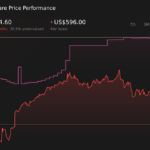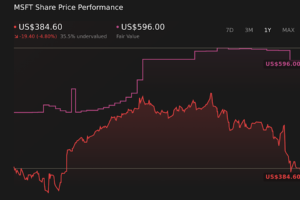<p class="canvas-atom canvas-text Mb(1.0em) Mb(0)–sm Mt(0.8em)–sm" type="text" content="Alibaba (NYSE: BABA), the top e-commerce and cloud player in China, went public at $68 per share in September 2014. The stock nearly tripled over the following five years, fueled by the growth of the company’s core marketplaces and ongoing expansions into adjacent markets.” data-reactid=”11″>Alibaba (NYSE: BABA), the top e-commerce and cloud player in China, went public at $68 per share in September 2014. The stock nearly tripled over the following five years, fueled by the growth of the company’s core marketplaces and ongoing expansions into adjacent markets.
<p class="canvas-atom canvas-text Mb(1.0em) Mb(0)–sm Mt(0.8em)–sm" type="text" content="But today the ongoing trade war, the Chinese economy’s slowdown, and a depreciating yuan are all curbing investor enthusiasm for Alibaba’s stock. As a result, the stock trades just over 20 times forward earnings, a low multiple compared to analysts’ forecasts for 30% sales growth and 28% earnings growth next year.” data-reactid=”12″>But today the ongoing trade war, the Chinese economy’s slowdown, and a depreciating yuan are all curbing investor enthusiasm for Alibaba’s stock. As a result, the stock trades just over 20 times forward earnings, a low multiple compared to analysts’ forecasts for 30% sales growth and 28% earnings growth next year.
Does the tepid near-term interest in Alibaba indicate that it’s time for long-term investors to hop on? Let’s see how the next five years could unfold for the Chinese tech giant.


Image source: Alibaba.
Maintaining its lead in the e-commerce market
<p class="canvas-atom canvas-text Mb(1.0em) Mb(0)–sm Mt(0.8em)–sm" type="text" content="Alibaba's marketplaces currently control 55.9% of China's e-commerce market, according to eMarketer. Its closest rival, JD.com (NASDAQ: JD), claims a 16.7% slice.” data-reactid=”27″>Alibaba’s marketplaces currently control 55.9% of China’s e-commerce market, according to eMarketer. Its closest rival, JD.com (NASDAQ: JD), claims a 16.7% slice.
Alibaba maintains that lead with four major marketplaces: its consumer-to-consumer platform Taobao, its business-to-consumer platform Tmall, its business-to-business platform Alibaba.com, and its overseas platform AliExpress.
<p class="canvas-atom canvas-text Mb(1.0em) Mb(0)–sm Mt(0.8em)–sm" type="text" content="Taobao and Tmall are the main growth engines of Alibaba's "core commerce" business, which grew its revenue 51% last year and accounted for 86% of its top line. Unlike JD, Alibaba only generates revenue from transaction fees, instead of taking on inventories or handling logistics. That capital-light strategy enables the core commerce business unit to remain firmly profitable, unlike Alibaba’s other business units.” data-reactid=”29″>Taobao and Tmall are the main growth engines of Alibaba’s “core commerce” business, which grew its revenue 51% last year and accounted for 86% of its top line. Unlike JD, Alibaba only generates revenue from transaction fees, instead of taking on inventories or handling logistics. That capital-light strategy enables the core commerce business unit to remain firmly profitable, unlike Alibaba’s other business units.
The number of mobile monthly active users (MAUs) across all of Alibaba’s marketplaces rose 3% sequentially to 721 million last quarter. Meanwhile, the Economic Intelligence Unit expects China’s middle class to grow from 10% of the population in 2015 to 35% by 2030, which should boost the spending power of Alibaba’s average online shopper as its MAU growth decelerates.
<p class="canvas-atom canvas-text Mb(1.0em) Mb(0)–sm Mt(0.8em)–sm" type="text" content="In other words, Alibaba's core commerce business should easily keep generating double-digit sales growth over the next five years. Alibaba will also keep feeding that growth by expanding into new markets like Southeast Asia, Russia, India, and Latin America.” data-reactid=”31″>In other words, Alibaba’s core commerce business should easily keep generating double-digit sales growth over the next five years. Alibaba will also keep feeding that growth by expanding into new markets like Southeast Asia, Russia, India, and Latin America.
An escalating cloud and fintech battle against Tencent
<p class="canvas-atom canvas-text Mb(1.0em) Mb(0)–sm Mt(0.8em)–sm" type="text" content="Alibaba controlled 43% of China's cloud platform market last year, according to IDC. Tencent (NASDAQOTH: TCEHY) ranked second with an 11.2% share.” data-reactid=”33″>Alibaba controlled 43% of China’s cloud platform market last year, according to IDC. Tencent (NASDAQOTH: TCEHY) ranked second with an 11.2% share.


Image source: Getty Images.
Alibaba has a first mover’s advantage in this market, but its cloud business isn’t profitable. The unit’s revenue rose 84% last year to 24.7 billion RMB ($3.6 billion) and accounted for 6% of its top line, but its operating loss also widened from 3.1 billion RMB to 5.5 billion RMB ($800 million).
<p class="canvas-atom canvas-text Mb(1.0em) Mb(0)–sm Mt(0.8em)–sm" type="text" content="Unlike Amazon, which supports the growth of its lower-margin marketplaces with its higher-margin cloud business, Alibaba supports the growth of its unprofitable cloud business with its profitable marketplaces. This makes it tougher for Alibaba to counter formidable cloud challengers like Tencent, which already owns China’s top messaging platform, WeChat, and the world’s biggest video game business.” data-reactid=”51″>Unlike Amazon, which supports the growth of its lower-margin marketplaces with its higher-margin cloud business, Alibaba supports the growth of its unprofitable cloud business with its profitable marketplaces. This makes it tougher for Alibaba to counter formidable cloud challengers like Tencent, which already owns China’s top messaging platform, WeChat, and the world’s biggest video game business.
Alibaba also competes against Tencent in the mobile payments market. Alipay (which Alibaba owns a major stake in) and Tencent’s WeChat Pay are the two most widely used payment apps in China. Both companies leverage their payment platforms to tether apps, services, retailers, and customers to their ecosystems, and it’s unlikely that one will overwhelm the other.
Investors should expect Alibaba’s cloud unit to remain unprofitable over the next five years as its battles against Tencent escalate.
A possible spin-off of its digital media unit
Alibaba’s cloud business is a weight on its bottom line, but the biggest money pit is its digital media and entertainment unit, which runs the video streaming platform Youku Tudou, the streaming music platform Alibaba Music, streaming video services for its e-commerce sites, its Alibaba Pictures movie division, and its UC web browsers.
<p class="canvas-atom canvas-text Mb(1.0em) Mb(0)–sm Mt(0.8em)–sm" type="text" content="Unlike Alibaba's commerce and cloud businesses, none of these digital plays leads its respective market. Tencent and iQiyi (NASDAQ: IQ) dominate the streaming video space, Tencent Music holds a near-monopoly in the streaming music market, and Chrome is the most popular web browser in China.” data-reactid=”56″>Unlike Alibaba’s commerce and cloud businesses, none of these digital plays leads its respective market. Tencent and iQiyi (NASDAQ: IQ) dominate the streaming video space, Tencent Music holds a near-monopoly in the streaming music market, and Chrome is the most popular web browser in China.
<p class="canvas-atom canvas-text Mb(1.0em) Mb(0)–sm Mt(0.8em)–sm" type="text" content="The unit's revenue rose 23% to 24.1 billion RMB ($3.5 billion) last year, but its net loss widened from 14.1 billion RMB to 20 billion RMB ($2.9 billion). Alibaba is clinging onto these businesses as defenses against Tencent, but I recently argued that it’s smarter to spin off the unit and retain a stake in the new company, as Baidu did with iQiyi. That spin-off might happen within the next five years.” data-reactid=”57″>The unit’s revenue rose 23% to 24.1 billion RMB ($3.5 billion) last year, but its net loss widened from 14.1 billion RMB to 20 billion RMB ($2.9 billion). Alibaba is clinging onto these businesses as defenses against Tencent, but I recently argued that it’s smarter to spin off the unit and retain a stake in the new company, as Baidu did with iQiyi. That spin-off might happen within the next five years.
Still a great, but imperfect, play on China’s growth
Alibaba remains one of the best long-term plays in China. It faces near-term challenges from JD and Tencent, but it will likely remain the 800-pound gorilla in the country’s e-commerce and cloud markets for the foreseeable future. As long as Alibaba keeps growing those two core businesses, and considers divesting its media streaming and movie-making businesses, its stock should continue rising over the next five years.
<p class="canvas-atom canvas-text Mb(1.0em) Mb(0)–sm Mt(0.8em)–sm" type="text" content=" More From The Motley Fool ” data-reactid=”60″> More From The Motley Fool
<p class="canvas-atom canvas-text Mb(1.0em) Mb(0)–sm Mt(0.8em)–sm" type="text" content="John Mackey, CEO of Whole Foods Market, an Amazon subsidiary, is a member of The Motley Fool’s board of directors. Leo Sun owns shares of Amazon, Baidu, JD.com, and Tencent Holdings. The Motley Fool owns shares of and recommends Amazon, Baidu, JD.com, and Tencent Holdings. The Motley Fool recommends iQiyi. The Motley Fool has a disclosure policy.” data-reactid=”69″>John Mackey, CEO of Whole Foods Market, an Amazon subsidiary, is a member of The Motley Fool’s board of directors. Leo Sun owns shares of Amazon, Baidu, JD.com, and Tencent Holdings. The Motley Fool owns shares of and recommends Amazon, Baidu, JD.com, and Tencent Holdings. The Motley Fool recommends iQiyi. The Motley Fool has a disclosure policy.









